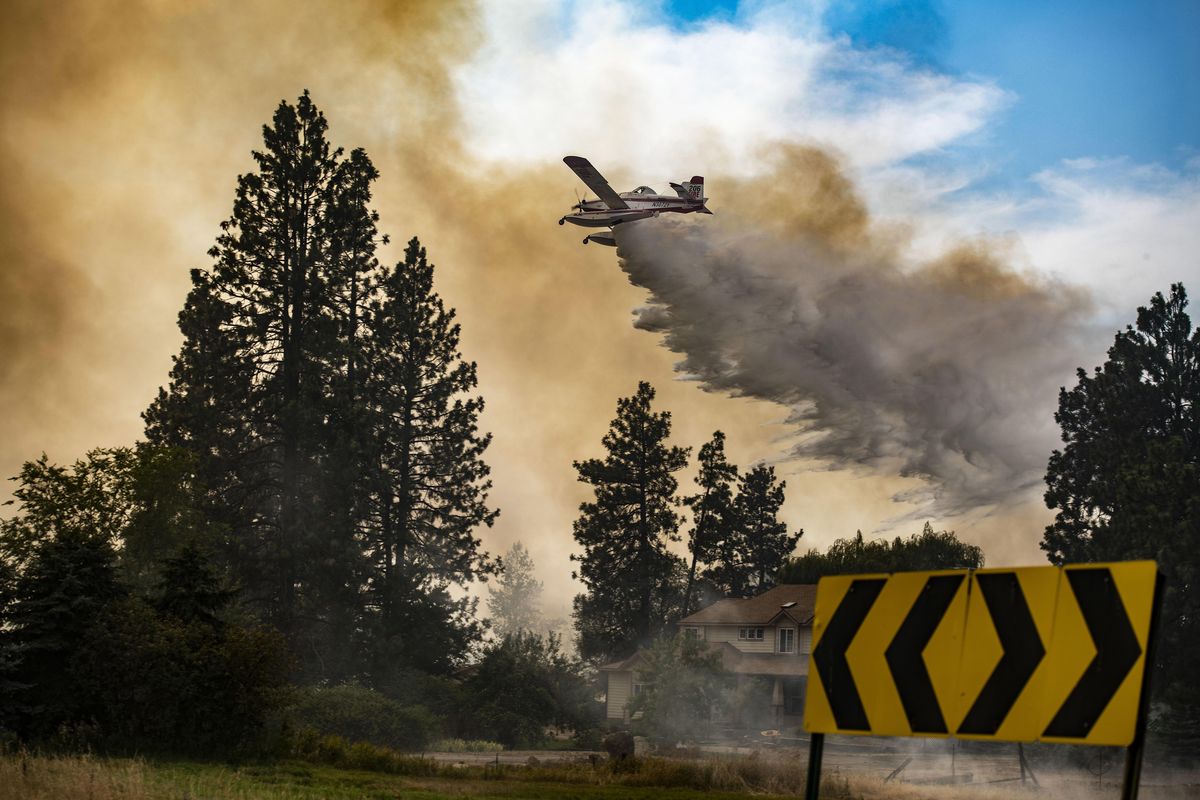Engine dead 500 feet above treeline, veteran Fire Boss pilot survives forced landing

First came a loud bang Tuesday and the aircraft’s single engine was dead. The Fire Boss pilot had 500 feet of elevation and 15 seconds to figure out a place to land with nothing but forested mountains below him.
The pilot, 43-year-old David Fennen, then saw a logging road and headed for it, said Ravi Saip, general manager of Air Spray USA, which is the company that employs the pilot. But at the last second, Fennen realized that trees on both sides of the road would likely take off his wings.
Instead, he settled the modified Air Tractor AT-802, commonly called a Fire Boss, airplane into the trees. The aircraft came tumbling down and the impact on the ground broke the pilot’s ribs and caused a bruised lung.
But Fennen, who declined an interview request Wednesday, climbed out of the wreckage and waved to pilots circling overhead.
“You just don’t walk away from these things. It’s pretty amazing,” Saip said. “This was not a luck thing. This was a skill thing.”
Air Spray USA is based in Chico, California. The company has eight firefighting aircraft, and it contracts with the Washington Department of Natural Resources and federal agencies to fight fires. That same aircraft and pilot had helped fight recent fires near Spokane, including the Upriver Beacon fire in July and the Silver Lake fire earlier this month that temporarily closed Interstate 90.
Fire Boss pilots “are critical,” DNR spokesman Joe Smillie said. “They are a big reason why we have been able to keep most of our fires small this year. They get up fast, they can refill fast and they are really skilled, which is what we can surmise from the landing” on Tuesday.
Before the forced landing, Fennen had just swooped down and filled his twin pontoons with water from the Columbia River. He was flying in the middle of a formation of three airplanes headed to help firefighters at the Horns Mountain fire in north Ferry County.
But in a remote area of Ferry County, almost dead center between US 395 at Goldstake and Northport, on State Highway 25, the engine failed, Saip said.
“He immediately pulled out of the flight of three and pointed his aircraft down slope to get a little bit of air speed,” Saip said of Fennen. “He instantly spotted a logging road and committed to a forced landing.”
The single engine on the modified airplane is known for its reliability, Saip said.
“In our minds, it’s a very unusual event to lose an engine,” he said. “That was a new airplane. It’s operated the last three (fire) seasons. It has less than 600 hours on that engine.”
Heading down, Fennen, who has more than 20 years of experience and who turns 44 on Friday, aimed for the logging road, Saip said.
“These guys are living at the edge every time we are out there fighting a fire. We train extensively for safety and emergency measures for low level a lot,” Saip said. “This pilot performed flawlessly.”
Saip explained that at the last second, Fennen opted to avoid trying to land on the road.
“If you catch a wing tip at 90 miles per hour, that doesn’t work well,” he said. “He opted to evenly distribute the airplane on the trees, which ultimately was a life-saving decision.”
Somehow, the aircraft did not catch fire upon impact with the trees or when it tumbled to the ground.
“It’s incredible the instantaneous reaction of training and knowing what to do in 15 seconds,” Saip said. “His protocol was perfect. The other two pilots attested that he had done everything perfectly.”
Once out of the wreckage, Fennen waved to the two-other circling aircraft. Those pilots then radioed the position of the downed plane to emergency responders. They sent trucks and dispatched the LifeFlight helicopter out of Spokane.
“It’s quite a drive from either side to get to that spot. I’m told that LifeFlight could not land, and he had to be trucked out, which was very painful,” Saip said. “They trucked him to a point where they could get to the helicopter.”
Fennen was flown to Providence Sacred Heart Medical Center where he spent Tuesday night. But Smillie, the DNR spokesman, said he learned Wednesday that Fennen had been released from the hospital.
Both Smillie and Saip said crews headed to the landing site Wednesday to begin recovering what was left of the aircraft.
“The airplane is totaled,” Saip said. Fennen is “a very seasoned pilot, very professional and more skilled than I could ever imagine. It’s on a scale of hero that he would save his own life.”